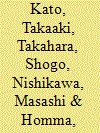| Srl | Item |
| 1 |
ID:
125468


|
|
|
|
|
| Publication |
2013.
|
| Summary/Abstract |
The attitude of local communities near a nuclear power plant (NPP) is a key factor in nuclear policy decision making in Japan. This case study compared local citizens' attitudes in 2010 and 2011 toward the benefits and drawbacks of hosting Kashiwazaki-Kariwa NPP. The Fukushima accident occurred in this period. After the accident, benefit recognition of utility bill refunds clearly declined, while that of public facilities did not, suggesting the influence of a bribery effect. The negative shift of attitudes about hosting the NPP after the accident was more modest in Kariwa Village, which saw a large expansion of social welfare programs, than in the other two areas, which lacked such a budget expansion. Policy implications of these results regarding the provision of economic incentives in NPP host areas after the Fukushima accident were discussed.
|
|
|
|
|
|
|
|
|
|
|
|
|
|
|
|
| 2 |
ID:
126559


|
|
|
|
|
| Publication |
2013.
|
| Summary/Abstract |
This study examines the influences of financial and non-financial factors on electricity-conservation behaviour. A random sample of 236 Japanese households participated in the field experiment and the participants were offered two interventions, such as monetary rewards, depending on their reduction in electricity consumption and comparative feedback. The average saving rates of the (i) reward-intervention group (5.9%) and the (ii) reward with comparative feedback group (8.2%) are statistically larger than those of the (iii) control group (1.7%). Our study demonstrates the following. First, our econometric analysis confirmed a significant response by households to financial incentives but a more inconclusive response to the treatment that provided non-financial, additional information. Second, we found a positive influence of treatment externalities across time and households on energy saving. Third, there is a heterogeneous treatment effect in the reward-intervention group, with the households having a high New Ecological Paradigm (NEP) score being more likely to respond to the reward programme and save electricity than those that do not. Finally, and most interestingly, differences in responses to the questionnaire before and after the experiment suggest that the participants had underestimated the marginal costs of saving electricity before they actually started to do so.
|
|
|
|
|
|
|
|
|
|
|
|
|
|
|
|